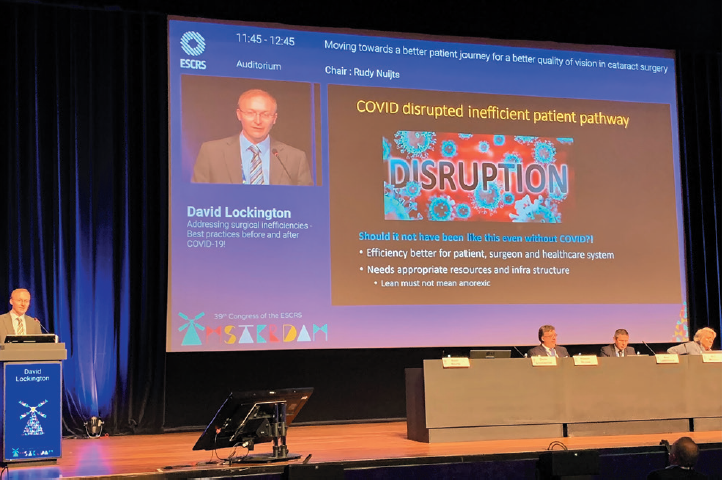“Are you going to the ESCRS Congress? I can’t be bothered…” This sentiment echoed in many conversations around ophthalmic departments in the UK when the invitation to attend the first in-person European clinical conference for nearly two years arrived. With a range of presentations and posters accepted and a speaking engagement, I always intended to go and support my trainees as they also delivered their talks. However, even they had become reluctant to attend in person! COVID restrictions and concerns had changed attitudes, and constantly changeable travel rules rendered the whole trip unattractive to some. As I checked and re-checked the multitude of paperwork required to both enter and leave Amsterdam, such thoughts also crossed my mind—why am I doing this? Is Zoom not easier? How do I put on a tie again?!
Having negotiated government websites, travel guidance, and the jeopardy associated with pre-flight COVID testing, finally getting into a taxi at Schiphol airport felt an achievement by itself. Receiving my name badge following passport and vaccine status checks prior to entering the conference venue will certainly account for some managerial CPD points at my next appraisal! Despite these minor impositions, it was reassuring to know that my health (and that of others) was being protected by the organisers. However, I don’t think I had emotionally prepared myself adequately for entering the arena, which was a totally surreal moment. People had smiles, not obscured by masks! Hugs and handshakes abounded as delegates re-connected with each other and the industry. Dinner plans were made, and tourist locations recommended. Although the in-person delegate numbers were lower than normal, this was not a negative, as it permitted more opportunities to see and speak to “the great and the good” in the world of ophthalmology. There was the wide programme of educational content as always, but with sufficient time to grab some lunch and wander around the trade exhibition, looking for friends and colleagues, and even engage in “Selfies with the Stars” to document on social media! From the big-name speaker to the first-time attendee, everyone had space and time to learn and share with each other.
As I returned to Schiphol to make my journey home, I took time to pause and reflect on the true purposes of such conferences. In-person conferences permit a break from your normal work constraints and provide you space to expand your horizons. You can attend a range of clinical talks to confirm or challenge your clinical practice. New technologies and techniques can be engaged with, and your patients will benefit when you learn from someone else’s learning curve, avoiding similar difficulties. Even attending some of the Young Ophthalmologists’ sessions helped me refine my teaching strategies. Furthermore, I have always taken the opportunity at conferences to approach a podium speaker or expert and ask them informally for their advice on a complex clinical case I might have. This type of peer discussion is good for our patients, and we have all missed out on that extra opinion over the past few years. Such interactions are often the first steps in developing clinical networks and supportive mentorships, and certainly laid the foundations for my eventual corneal fellowship in New Zealand more than eight years ago.
Ultimately, engaging in person with friends and colleagues again was cathartic and a small glimpse of what normal life can be like—it was good to have been there. Some of the most difficult circumstances of the pandemic have involved restrictions that prevented us from visiting and supporting friends and family. People are made for people, and attending this ESCRS Congress in Amsterdam clearly demonstrated that ophthalmology is a community at heart. It is always worth the effort to stay connected with your relatives, and I am glad I bothered to make the time to be with my international Eye Family. Hope to see you at our next reunion!
Dr David Lockington MB, BCh, BAO (Hons), FRCOphth, PhD practices at the Tennent Institute of Ophthalmology, Glasgow, UK. davidlockington@hotmail.com


